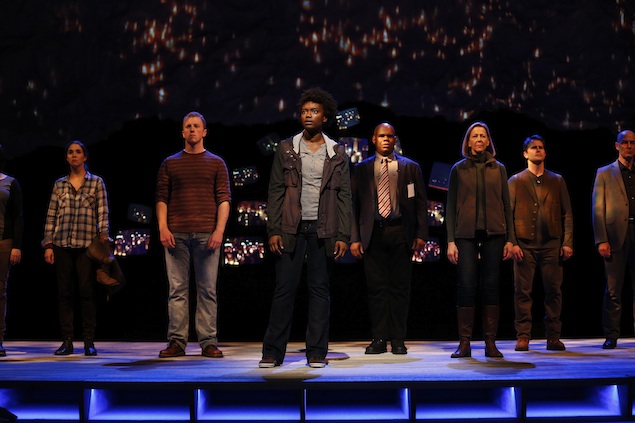
It’s a testament to
Moises Kaufman and the Tectonic Theater Project, to director
Matthew Gardiner, to a truly extraordinary cast, and to the spirit of
Matthew Shepard himself that not even a government shutdown could thwart last night’s media performance
of
The Laramie Project.
After some scrambling by Ford’s Theatre when it
transpired that the company wouldn’t
be able to use its National Parks Service-managed site while
the government was
closed,
Ford’s borrowed a rehearsal room from Woolly Mammoth Theatre
Company, canceled most
non-media tickets, and staged the show without lighting or sets
in a much smaller
and less formal space than the 661-seat theater where Lincoln
was shot.
And the performance was fantastic. It’s such a hoary old cliché to say that a show
must go on, but it could, and it did, and you get the sense that these eight actors
could perform this show on a platform at Metro Center during rush hour and still do
it justice. This is the first-ever DC staging of
The Laramie Project, which premiered in 2000, two years after 21-year-old student Matthew Shepard was
tortured and beaten to death by two men for the crime of being gay. The 15th anniversary
of the crime is October 6; Ford’s is staging the work as part of its Lincoln Legacy
Project to promote tolerance and civil discourse. If the remainder of the show’s run
is threatened, therefore, by the intolerant and distinctly uncivil squabbling on Capitol
Hill, it will be not only horribly ironic but also a great, great shame.
Devised and written by Kaufman and other company members of Tectonic Theater Project,
the show details how the actors traveled to Laramie several times over the course
of 18 months after Shepard’s death, conducting over 200 interviews and sourcing more
information from journal entries, letters, police reports, and other archival documents.
While the play uses Shepard’s death as a focal point, it seems to be more curious
about the aftermath of a notoriously awful event, and what happens when a town becomes
“a noun, like Waco or Jasper” (where James Byrd Jr. was also murdered in 1998). What
happens to the psyche of the community? How do its members start to paint over the
cracks?
What becomes clear watching
Holly Twyford playing Officer Reggie Fluty—who was called to the scene when Shepard’s body was found,
and who describes to the audience how the only parts of his face that weren’t covered
in blood were the parts where his tears had washed it clean—and witnessing other actors
such as
Mitchell Hébert,
Kimberly Gilbert, and
Kimberly Schraf transform themselves from teenagers to religious leaders to Shepard’s parents, is
that Laramie’s lessons are different for everyone. The cast play actors interviewing
Laramie residents such as an evangelical priest (Chris Stezin) who hopes Shepard had time to think about his lifestyle while he lay dying in the
prairie. Gilbert plays Shepard’s friend, Romaine, who organizes an angel protest to
silence the voice of hate preacher Fred Phelps (Hébert). The actors also reenact key
moments in the case, like the statements made to the press by the COO (Craig Wallace) of the hospital where Shepard died, and the trial where Shepard’s killers (both
played by
Paul Scanlan) were sentenced to life in prison.
The actors may not have had lighting or sets or even time (a statement before the
show said that none of them had rehearsed in the space or even set foot in it until
three hours before the performance), but they didn’t seem to need them.
Helen Huang’s costumes—a police jacket here, a baseball cap there—helped them leap from character
to character, and the staging and choreography seemed tight. Hébert used nothing but
an Eastern European accent to play Kaufman, and
Katherine Renee Turner needed only glasses and a slightly stiff affect to play a professor in Laramie discussing
her own experiences as a gay woman.
French chef Urbain Dubois once said that the ambition of every cook must be to make
something very good with the fewest possible ingredients. In the case of this forcibly
trimmed-down
Laramie Project, and to use a horrible political metaphor, the fundamentals of this production are
enormously strong. Gardiner’s direction, and the heartfelt, fierce, committed performances
of his actors, are more than enough to create scenes and locations and moments of
pure heartbreak. I hope they get to play the rest of the run at Ford’s, but if they
don’t, wherever they perform it will be good enough.
The Laramie Project
is scheduled to run at Ford’s Theatre through October 27, although performances through October 6 have been canceled due to the government shutdown. Two free shows will be held on Friday,
October 4, and Tuesday, October 8, at United Church of Christ
(945 G St., NW) at 7:30 PM, with tickets available at the door on a first-come, first-served basis. Other performance times and locations are TBD. Running
time is two and a half hours, with two intermissions. For tickets and more information,
visit Ford’s website.

















